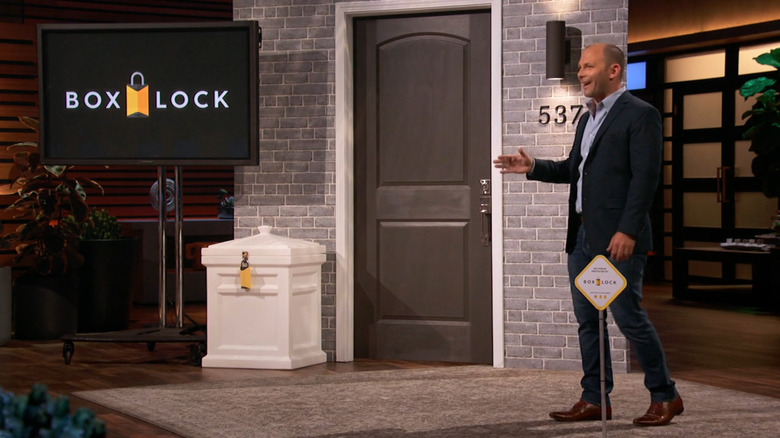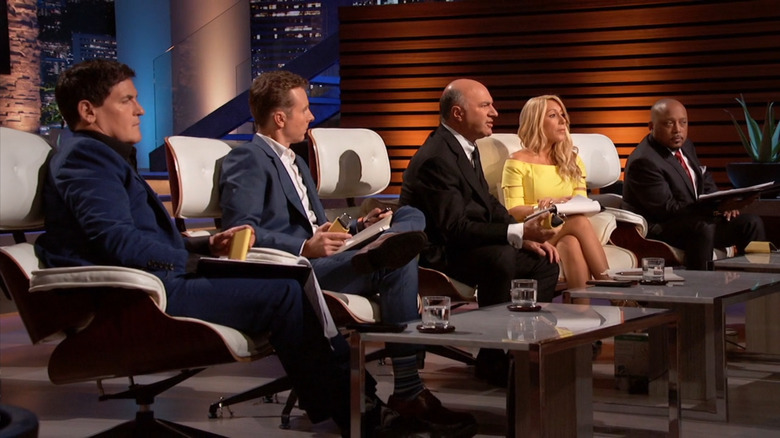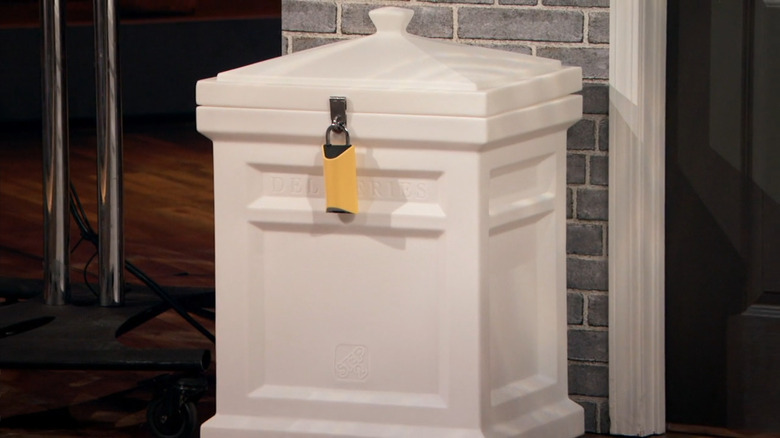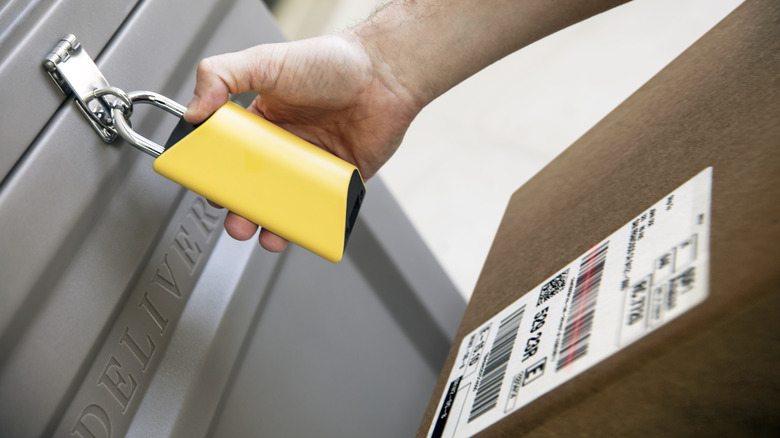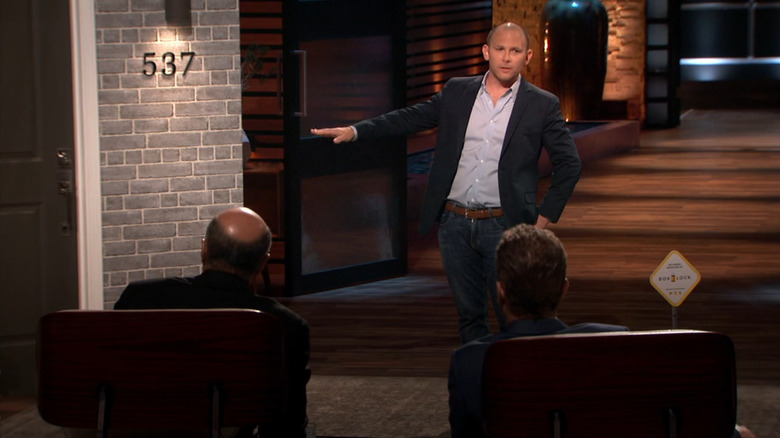What Happened To BoxLock Smart Lock From Shark Tank Season 10?
We may receive a commission on purchases made from links.
Season 10 of "Shark Tank" premiered on October 7, 2018, to just under 3 million live and same-day viewers. While that season would go on to see tech-related pitches such as the Bundil App and the Goalsetter app, the very first product was BoxLock, a system for providing secure package lockers for individual consumers. As explained by founder Brad Ruffkess, the special sauce was that the padlocks were internet-connected and tied to tracking numbers for packages at the address where BoxLock is being used. This makes it so that scanning the carriers' existing tracking barcodes is what unlocks the lock.
With the product being so new with minimal sales so far, most of the Sharks weren't interested, and his sole offer was pulled before long. The kicker was that seemingly the perfect Shark for him, guest Shark and creator of the Ring video doorbell Jamie Siminoff, was not interested and felt too many changes to consumer behavior would be required for BoxLock to be a success.
BoxLock soldiered on, though, and has since pivoted to a focus on being a B2B-focused company. But has it worked? Let's find out.
What happened to BoxLock on Shark Tank?
Brad Ruffkess entered the "Shark Tank" seeking a $1 million investment for 5% equity in BoxLock, his startup making internet-connected padlocks with the goal of consumers and businesses having easy-to-use package lockboxes. As he explained the special sauce was based on BoxLock syncing up with all of the major package carriers' tracking systems. So when a package is listed as out for delivery to your registered address, the delivery driver can get access to the lockbox simply by scanning the tracking barcode with the lock. That opens the lock, and once the lock is closed back up, the customer gets a notification that the packages have been delivered securely.
Ruffkess explained that BoxLock had spent approximately $500,000 in research and development. As for sales, at the time of the shooting — roughly June 2018 — he added that he had sold approximately 800 units' worth of pre-orders on Kickstarter at $89 to $109, for a total of roughly $80,000 in sales. The cost of manufacturing was about $65 with a planned retail price of $129.
The Sharks were incredibly skeptical of Ruffkess's $20 million valuation, and he didn't do a good job explaining why he set it that high. Guest Shark and Ring founder Jamie Siminoff, citing the valuation and need to change user behavior, was the first to opt-out, with Mark Cuban, Daymond John, and Kevin O'Leary quickly following for similar reasons. Lori Greiner, the final Shark, was willing to give the $1 million as a loan at 8% interest for 2.5% equity, paid back as a royalty to be determined until she made back $1.5 million. Ruffkess countered at $1.5 million with a $3 royalty, but after Greiner's attempt to get Siminoff in on the deal failed, she pulled out.
What happened to BoxLock after Shark Tank?
According to a press release issued shortly after Ruffkess appeared on "Shark Tank," (but before the episode aired), BoxLock was made available exclusively at Amazon. 10 months later, in May 2019, BoxLock announced that it had secured distribution deals with Home Depot (online) and Ace Hardware (in the chain's "more than 5,000 brick and mortar retail locations").
"BoxLock is the only nationally available solution that protects deliveries made by all major carriers and nearly 500,000 drivers (and counting) have been trained on the BoxLock system," reads the announcement. "Even drivers who have never before used BoxLock say the system is intuitive and easy to use; most deliveries can be completed in 20 seconds or less, making the solution faster than an attended delivery." The release added that BoxLock's app had added an additional feature: Being able to generate unique barcodes for single use, multiple use, or specific dates, which would allow other/smaller pickup and delivery services to use BoxLock for the likes of groceries and laundry.
19 months later, in another press release, BoxLock pivoted into more of a B2B-centric model by announcing a partnership with SDI, "the leader in B2B digital supply chain services." In the release, Ron Fijalkowski, Senior Vice President of Digital Supply Chain Solutions at SDI, explained why this made sense. "Even before COVID amplified the need for touchless transactions, customers wanted to ensure that their mission-critical spares, including PPE and other essential materials, were secured," he said. "They want to be able to track their materials from order to receipt and have the visibility and confidence that those materials are where they're supposed to be."
Andrew Kelley, BoxLock's Chief Commercial Officer, added "The contactless access control value proposition of BoxLock is applicable during the pandemic more than ever."
Is BoxLock still in business?
BoxLock solidified its B2B emphasis in 2021 with a series of moves. In April, it announced new locks designed specifically for enterprise use, which was followed by the announcement of the company's C-suite hires a few weeks later and, six months after that, the move into medical specimen collection. More specifically, that last press release announced partnerships with Parsyl for supply chain data and McShane Welding, which specializes in lab pickup boxes.
"BoxLock's new Cam Lock form factor includes Parsyl environmental sensor support, X-Ray capabilities, and new hold time metrics so that laboratories can better service their clients with higher quality lab results, more reliable, efficient specimen logistics, and enhanced visibility," reads the November 2021 press release. "BoxLock Control, the company's cloud-based platform for managing data and devices, integrates into route management and lab information management systems to help reduce empty stops which account for roughly 30% of all specimen pickup attempts."
Driving the point home, as of January 2025, it appears that BoxLock is no longer available on Amazon.
What's next for BoxLock?
Going by their LinkedIn pages, Brad Ruffkess and Mike Glass are still in charge of BoxLock. Ruffkess's page, in particular, emphasizes that BoxLock is "the Supply Chain Access Control Platform," highlighting the compan's B2B focus. As for the executives whose hirings were announced in 2021, Chief Financial Officer Michael Coyne switched to being an "Advisor" in August 2023, while Chief Commercial Officer Andrew Kelley, III left in December 2021.
The most up-to-date information about BoxLock these days seemingly comes from the posts on its LinkedIn page. The most recent posts, for example, deal with BoxLock as a solution to prevent equipment theft on construction sites. Other posts from the last year or so as of this writing include a focus on the medical specimen logistics side of the business. BoxLock notes that more than 30% of lab pickup trips result in the retrieval of zero specimens, with the idea being that BoxLock could change that by keeping couriers informed about when a specimen is present.
It's clear that BoxLock has pivoted away from consumer package delivery long-term, but how well the current B2B focus is going is a much more opaque topic.
"Shark Tank" is available for purchase on Prime Video.
